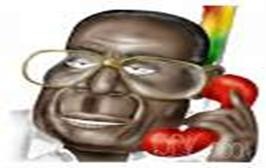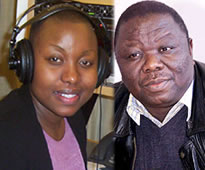Sunday view with Trevor Ncube
I HAVE just come back from two weeks home in Zimbabwe and my heart is sore. I am troubled by what is going on, much of it away from the glare of local and international media.
Zimbabweans are under siege from a political leadership that fought to liberate them from colonial oppression. And I am afraid that the current oppressors are proving to be no different in their tactics and cruelty from Ian Smith's settler regime.
Because of the absence of an independent daily press and private radio and television outlets, many Zimbabweans are totally oblivious of the reign of terror that President Robert Mugabe has unleashed on the opposition and civil society activists. However, the victims of this violence are telling their story and the word is spreading, and so is fear.
In certain instances there has not been any attempt to mask the violence as happened in broad daylight at Mbare Musika bus terminus and Fourth Street commuter rendezvous on the eve of the Easter holiday. In both instances riot police armed to the teeth randomly assaulted people waiting for transport to their holiday destinations for no reason. There have been countless other instances of indiscriminate police and army violence against civilians.
The government media pretends all is well and completely ignores the State-sponsored terror. The independent press is handicapped in telling the unfolding orgy of state violence by being weekly.
Since the arrest and the brutal attack on Morgan Tsvangirai and other Movement for Democratic Change (MDC) officials, President Mugabe's government has unleashed a ferocious campaign of violence against journalists, political and civil society activists.
Evidence indicates that he has set up a paramilitary unit whose main brief is to abduct, torture and murder opposition activists and unarmed civilians. This is the same unit that has embarked on a petrol-bombing campaign whose main purpose is to portray the opposition MDC as a terrorist organisation. Fortunately only the insanely gullible have been taken in by this propaganda ploy.
There is practically an undeclared state of emergency in the townships where after dusk residents venture outside their homes at great risk. Initially this terror campaign was concentrated in and around Harare but is spreading countrywide. Gangs of heavily armed state thugs prowl the townships hunting for their targets in unmarked vehicles. It is believed these are the same people that assaulted MDC spokesman and MP Nelson Chamisa at Harare International Airport three weeks back.
The petrol bombing campaign has also been used to trump up charges against opposition elements that have been abducted and tortured in police detention to try and extract evidence from them. Senior MDC officials like Ian Makone and Last Maengahama have been victims of this campaign.
While the MDC are not angels, few believe they have the capacity to organise the alleged bombing campaigns.
So far one television journalist, Edward Chikomba and an MDC activist, Gift Tandare, have been abducted, tortured and murdered. Another journalist, Gift Phiri, was abducted and tortured after being accused of involvement in the spree of bombings. At the last count, over 600 people were known to have been beaten and some tortured in detention and the figure continues to rise. Indications are that approximately 30 people a day are admitted to hospitals around the country mostly at night and mornings, following brutal assaults under the cover of darkness. The poorly equipped and cash-strapped state hospitals are failing to cope and the MDC this week launched an appeal for funding and medication to take care of its members.
All this violence is seen as evidence that President Mugabe, who boasts of "degrees in violence", has launched his 2008 election campaign. Since he has nothing to offer the electorate his powers of persuasion are limited to violence. It worked for him during Zimbabwe's liberation struggle, in Matabeleland in 1982-1987 and he is sure this tried and tested strategy will not fail him. This is the same violence witnessed in the run-up to the 2000 and 2002 parliamentary and presidential elections respectively in the name of land reform.
The purpose of this violence is to intimidate and it is working. The vigilante groups aim to break the backbone of trade unions and paralyse MDC's structures. There is a palpable sense of fear across Zimbabwe. The assault on Tsvangirai sent a clear message that nobody is out of reach. And the public is justified in asking: "If they can do it to Morgan who am I to try and stand up to the regime?"
Thus the rigging of the March 2008 parliamentary and presidential elections has started in earnest. The campaign of violence 11 months ahead of the elections, the repressive and punitive media laws, an undemocratic Electoral Act and an oppressive Public Order and Security Act are all vital ingredients in Zanu PF and Mugabe's road to victory.
Yet the situation is most likely to get worse before the elections. This is no environment to conduct democratic elections. But it is opportune for President Thabo Mbeki who has been mandated by Sadc to broker talks between Zanu PF and the MDC. It should open his eyes to the enormity of the task that lies ahead for him.
So what is the way forward?
The wave of State-sponsored terror must be brought to an end before President Mbeki gets the talks going. Mbeki, with the backing of Sadc, must seek to have a broad based national dialogue that includes church leaders, business, trade unions and other civil society players. A durable solution to Zimbabwe's problems requires the involvement of more players beyond Zanu PF and MDC.
Mugabe is itching for a fight and would love for MDC to respond in kind to enable him to kill once and for all the national democratic project. He has the instruments of the State to do this. It must be remembered that Mugabe has vowed that the MDC will never rule Zimbabwe for as long as he is alive. He is prepared to do anything to achieve this goal. The danger though is that were violence to spin out of control there is no guarantee he would have his way.
When the violence has been quelled, Mugabe must be asked to disband his private militia and stop recruiting war veterans into a reserve army, which is essentially a personal army. The national youth militia, commonly known as the "Green Bombers", must be disbanded. Central to the conduct of a free and fair election is the repeal of repressive media and public security laws which infringe on freedom of expression and assembly.
The Electoral Act will have to be reviewed and all electoral functions taken away from state security operatives. A transparent voter education and registration exercise must be put in motion to include Zimbabweans in the Diaspora. All military personnel currently heading state companies and other organisations will have to be sent back to the barracks or retired.
As part of his strategy for victory in March 2008 Mugabe has announced that he plans to expand the House of Assembly and the newly created Senate from 150 to 210 and 66 to 84 respectively. He must be dissuaded from embarking on this self-serving project whose sole purpose is to reward the Zanu PF faithful and continue to abuse the rural electorate.
In the past Mugabe has used promises of talks with the MDC as a ruse to buy himself time and he must not be allowed to do this again. For these talks to be successful, Mugabe would have to concede a lot of ground on the stumbling blocks to a free and fair election.
The media laws, the electoral act, the violence and intimidation and the security laws have been pivotal in his winning elections this far and to do away with them would be akin to committing political hara-kiri. I doubt that Mugabe is ready to negotiate himself out of office. Without these key pillars it is not possible for Mugabe to win a free and fair election. This means that these negotiations will be sticky if they do take off at all.
Indeed if the list of concessions sought sounds like a surrender document, it is because over the years Mugabe has heavily loaded the political dice in his favour and this simply needs to be undone. It is not likely that stubborn Mugabe will succumb to this, thus setting the stage for stillborn talks and controversial elections next year. But there is no harm in giving the talks a chance.
The current violence must be brought to an end not as a condition for the talks but simply because it is barbaric and does not belong to the future the majority of Zimbabweans desire. It goes against everything SADC and President Mbeki and his African Renaissance project stand for, and must be rejected and condemned in the strongest terms.





No comments:
Post a Comment